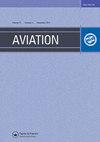空中交通管制员ab-initio的清晰度和发音
IF 1.3
Q3 ENGINEERING, AEROSPACE
引用次数: 2
摘要
越来越多的飞机在世界各地飞行,这就要求空中交通管制员提高他们的通信技能,以应对未来高需求的交通。本文研究了六名从头算空中交通管制员在模拟训练中飞行员与管制员通信中的通信错误。收集了三个多小时的会话,并使用会话分析进行了定性分析。转录的数据总共产生了62个通信错误。数据显示,从头算控制器的清晰度和发音导致了通信问题,并降低了空中交通控制器的通信效率。相比之下,发音错误很少会削弱管制员和飞行员的理解力,他们有着相似的第一语言,并且熟悉在通用语言环境中使用英语。该研究还描述了飞行员控制器通信中通信错误的其他情况。结果表明,从一开始,空中交通管制员就需要精通飞行员与管制员沟通的三个主要领域来提高他们的表现:航空用语、航空英语和航空知识。研究结果表明,飞行员和空中交通管制员在进行要求他们精通语言技能的航空培训之前,应该在航空语言能力测试中达到4级(操作)。本文章由计算机程序翻译,如有差异,请以英文原文为准。
CLARITY AND PRONUNCIATION OF AB-INITIO AIR TRAFFIC CONTROLLER
The increasing number of aircraft flying around the world has led to the requirement for air traffic controllers to improve their communication skills to face high demand traffic in the future. The paper examines the communication errors in the pilot-controller communication of six ab-initio air traffic controllers during simulation training. More than three hours of conversation were collected and analyzed qualitatively using conversational analysis. The transcribed data yielded a total of 62 instances of communication errors. The data revealed that clarity and pronunciation of ab-initio controllers contributed to problematic communication and reduced the efficiency of the air traffic controllers in communicating. In contrast, pronunciation errors rarely diminished comprehension amongst the controllers and pilots who share a similar first language and are familiar with the use of English in a lingua franca setting. The study also describes other instances of communication errors in pilot-controller communication. The results indicate that ab-initio air traffic controllers need to be proficient in three main areas in pilot controller communication to improve their performance: aviation phraseology, aviation English, and aviation knowledge. The findings suggest that pilots and air traffic controllers should achieve level 4 (operational) in aviation language proficiency test, before proceeding to aviation training that requires them to be proficient in their language skills.
求助全文
通过发布文献求助,成功后即可免费获取论文全文。
去求助
来源期刊

Aviation
ENGINEERING, AEROSPACE-
CiteScore
2.40
自引率
10.00%
发文量
20
审稿时长
15 weeks
期刊介绍:
CONCERNING THE FOLLOWING FIELDS OF RESEARCH: ▪ Flight Physics ▪ Air Traffic Management ▪ Aerostructures ▪ Airports ▪ Propulsion ▪ Human Factors ▪ Aircraft Avionics, Systems and Equipment ▪ Air Transport Technologies and Development ▪ Flight Mechanics ▪ History of Aviation ▪ Integrated Design and Validation (method and tools) Besides, it publishes: short reports and notes, reviews, reports about conferences and workshops
 求助内容:
求助内容: 应助结果提醒方式:
应助结果提醒方式:


